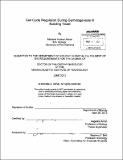Cell cycle regulation during gametogenesis in budding yeast
Author(s)
Attner, Michelle Andrea
DownloadFull printable version (19.09Mb)
Other Contributors
Massachusetts Institute of Technology. Department of Biology.
Advisor
Angelika Amon.
Terms of use
Metadata
Show full item recordAbstract
Sexual reproduction depends on meiosis, the specialized cell division that gives rise to gametes. During meiosis, two consecutive rounds of chromosome segregation follow one round of DNA replication to yield four haploid gametes from one diploid progenitor. In meiosis I, homologous chromosomes segregate and in meiosis 11, sister chromatids split. Much of the same cell cycle machinery controls mitosis and meiosis. However, segregation of homologous chromosomes in meiosis I and progression into meiosis 11 directly after meiosis I necessitate several modifications to the basic cell cycle machinery. In this thesis, I have investigated how cell cycle regulators function during gametogenesis. First, I show that the mitotic exit network, which is a signaling pathway essential for mitotic exit, is dispensable for the meiotic divisions, and in fact signals via a mechanism distinct from mitosis. Second, I present data that the Polo kinase Cdc5, which activates mitotic exit in budding yeast, has gained additional roles during meiosis 1. I show that CDC5 is required for the removal of cohesin from chromosome arms in meiosis I, which is a prerequisite for meiosis I segregation. Despite the central role of CDC5 in regulating meiosis I, CDC5 is dispensable during meiosis 11. In sum, understanding how cell cycle regulators control the specialized meiotic divisions has improved our understanding of how different cell division types are established.
Description
Thesis (Ph. D.)--Massachusetts Institute of Technology, Dept. of Biology, June 2013. "June 2013." Cataloged from PDF version of thesis. Includes bibliographical references.
Date issued
2013Department
Massachusetts Institute of Technology. Department of BiologyPublisher
Massachusetts Institute of Technology
Keywords
Biology.